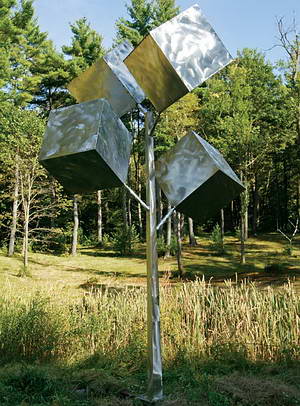|
| ||||||
|
| |||||||
|
| |||||||
|
Texana:
Texas Book Reviews Reviews of Texas General, Texana, Texas wine books and Guides Cookbook Reviews All our reviews of cookbooks News Stories Stories on major events, people and culture Notable Native Texans The famous and infamous born in Texas Texas Sports Store Clothing for UT, Texas A&M and Texas Tech
Free Newsletter
Register to receive our free monthly Texana newsletter Message Boards Ask questions, discussions
Visit & Bookmark:
Texas Cooking www.texascooking.com Recipes, food articles, barbecue, chili, desserts |
 Cluster of Four Cubes by George Rickey Collection George Rickey Estate A Nice Turn of Events at the McNay
by Steve Labinski Rotating wheels. Swinging gimbals. Moving gyroscopes. The McNay Art Museum in San Antonio presents a literally moving exhibit of kinetic sculpture by American artist George Rickey until January 11, 2009. Until his death in 2002, Rickey made a name for himself building sculptures of gleaming metal, most relying on wind, gravity or inertia to give them movement. None uses any kind artificial or battery power. Most visitors to the museum will be in for a nice surprise, and not just because of the George Rickey kinetic sculpture exhibit. The McNay opened back in 1950 as Texas' first museum of modern art, exhibiting the private collection of Marion Koogler McNay, who passionately collected art until her death. Over the years, many people have walked through the McNay, a winding 24-room mansion stuffed to the hilt with objects of art often to the point of looking cluttered. If you have not visited in several years, prepare yourself for a pleasant surprise. In June, 2008 the museum opened a spacious two-story wing that doubles the museum space. Not only can the entire collection can be fully displayed now, but also there's ample room for interesting touring exhibits, the first significant being the George Rickey retrospective. Forty-nine of Rickey's works are on view both indoors as well as outdoors on the museum grounds. Although the thirteen dollar admission fee is worth every penny (there are also discounts for seniors, students, children and military), anyone can make a rewarding trip simply by walking the open grounds of the museum and taking in Rickey's sculpture at no cost. (See our own YouTube Video) There is something soothing and contemplative in the moving "gyratory." The McNay's newly built sculpture gardens are well arranged, all with benches of marble, all tailor made to draw in viewers. Many of Rickey's pieces possess clear aspects of the artist's sense of humor and outlook on life. His sculptures may move like machines, but they do absolutely nothing useful, all an answer to his view of Americans' obsessions with usability and productivity. Later into the artist's career, Rickey developed more complex motions, combining them into new kinds of interactions. Outdoor sculptures such as Cluster of Four Cubes or Two Red Lines quietly command attention, always shifting and always silent. The circular, spinning Space Churn is another impressive outdoor sculpture. The new expansion of the McNay is worth a visit all by itself, but the exhibit of Rickey's kinetic sculptures is something that anyone can enjoy. George Rickey Kinetic Sculpture: A Retrospective runs from October 1, 2008 to January 11, 2009. Visit www.mcnayart.org for admission prices and more information on special events.
Steve Labinski lives in Austin, TX.
|
|